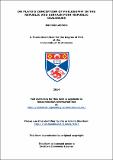Files in this item
On Plato's conception of philosophy in the Republic and certain post-Republic dialogues
Item metadata
| dc.contributor.advisor | Broadie, Sarah | |
| dc.contributor.author | Labriola, Daniele | |
| dc.coverage.spatial | 257 | en_US |
| dc.date.accessioned | 2014-03-10T16:27:00Z | |
| dc.date.available | 2014-03-10T16:27:00Z | |
| dc.date.issued | 2014 | |
| dc.identifier.uri | https://hdl.handle.net/10023/4497 | |
| dc.description.abstract | This dissertation is generally concerned with Plato’s conception of philosophy, as the conception is ascertainable from the Republic and certain ‘post-Republic’ dialogues. It argues that philosophy, according to Plato, is multi-disciplinary; that ‘philosophy’ does not mark off just one art or science; that there are various philosophers corresponding to various philosophical sciences, all of which come together under a common aim: betterment of self through intellectual activity. A major part of this dissertation is concerned with Plato's science par excellence, ‘the science of dialectic’ (he epistêmê dialektikê). The science of dialectic is distinguished in Plato by being concerned with Forms or Kinds as such; the science of dialectic, alone amongst the philosophical sciences, fully understands what it means for Form X to be a Form. I track the science of dialectic, from its showcase in Republic VI and VII, and analyze its place in relation to the other philosophical sciences in certain post-Republic dialogues. Ultimately, I show that, whilst it is not the only science constituting philosophy, Plato’s science of dialectic represents the intellectual zenith obtainable by man; the expert of this science is the topmost philosopher. In this dissertation I also argue that Socrates, as variously depicted in these dialogues, always falls short of being identified as the philosopher par excellence, as that expert with positive knowledge of Forms as such. Yet I also show that, far from being in conflict, the elenctic Socrates and the philosopher par excellence form a complementary relationship: the elenctic philosopher gets pupils to think about certain things in the right way prior to sending them off to work with the philosopher par excellence. | en_US |
| dc.language.iso | en | en_US |
| dc.publisher | University of St Andrews | |
| dc.rights | Creative Commons Attribution 4.0 International | |
| dc.rights.uri | http://creativecommons.org/licenses/by/4.0/ | |
| dc.subject | Plato | en_US |
| dc.subject | Ancient Greek philosophy | en_US |
| dc.subject | Philosophy | en_US |
| dc.subject | Philosopher | en_US |
| dc.subject.lcc | B398.D5L2 | |
| dc.subject.lcsh | Plato. Dialogues | en_US |
| dc.subject.lcsh | Socrates--Early works to 1800 | en_US |
| dc.subject.lcsh | Philosophy--Early works to 1800 | en_US |
| dc.subject.lcsh | Dialectic--Early works to 1800 | en_US |
| dc.subject.lcsh | Philosophers--Early works to 1800 | en_US |
| dc.title | On Plato's conception of philosophy in the Republic and certain post-Republic dialogues | en_US |
| dc.type | Thesis | en_US |
| dc.type.qualificationlevel | Doctoral | en_US |
| dc.type.qualificationname | PhD Doctor of Philosophy | en_US |
| dc.publisher.institution | The University of St Andrews | en_US |
This item appears in the following Collection(s)
Except where otherwise noted within the work, this item's licence for re-use is described as Creative Commons Attribution 4.0 International
Items in the St Andrews Research Repository are protected by copyright, with all rights reserved, unless otherwise indicated.


